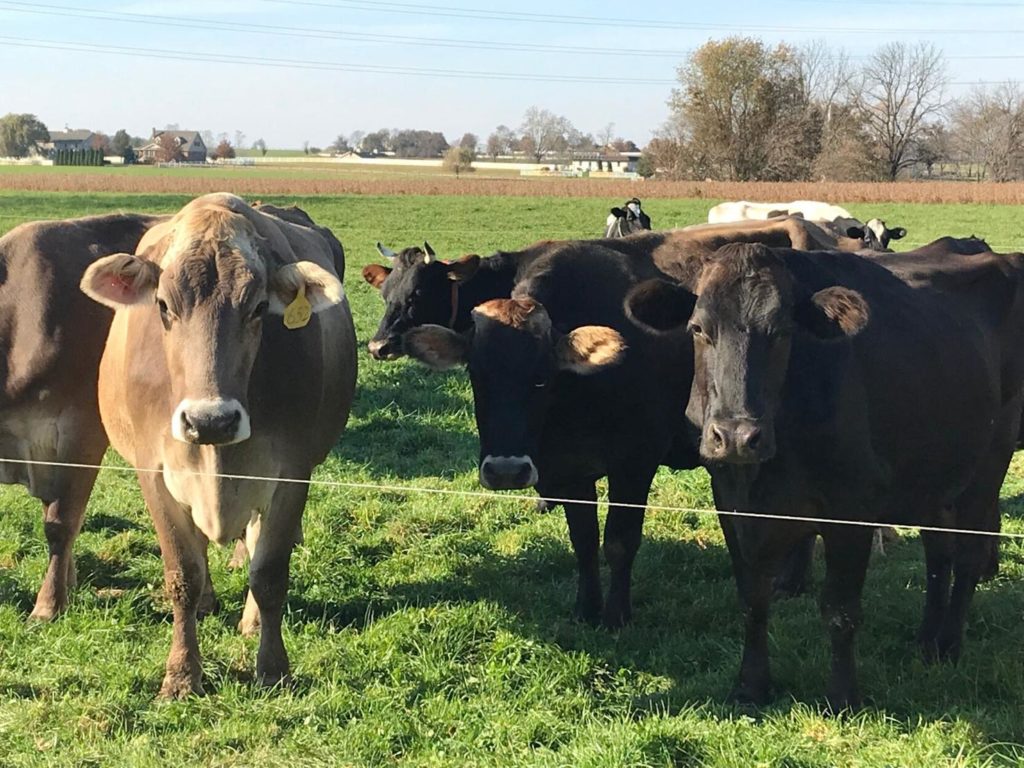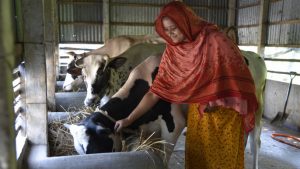The structure was built about five years ago, primarily for the flour mill upstairs. The lower level is now the site for a high-temperature, short-time pasteurization system that has helped Beiler’s Heritage Acres head in a new direction.
When he lost his wholesale market, Beiler decided to pasteurize, bottle and sell his milk himself. The Amish farmer, who has been in business for 40 years, bought the equipment with the help of Steward, a private lender that helps farmers generate new revenue.
Spike Gjerde, a chef and founder of Baltimore’s Woodberry Kitchen, worked for Steward as a liaison between the lender and Beiler.
“He was faced with the choice of either selling off his herd and losing that part of his farm income or this other kind of radical solution,” Gjerde said. “To add his own processing equipment onto the farm and take the bull by the horns, if you will. The reason most farms don’t consider that is because the cost is very high.”
Steward helped Beiler with a loan for $527,499 that he has since paid in full, according to the company’s website. Gjerde said the lender guided Beiler through the complexities of getting his Grade A license so he could sell the milk. Steward also assisted with marketing.
The first conversations between the two took place in 2018, and it wasn’t an easy road. Beiler had to renovate the room to fit the equipment and learn the pasteurization process. There were moments of frustration.
“There were a couple of different phases,” Beiler said. “A couple of times I was like, ‘This doesn’t make any sense.’ I was about to throw everything back to where I’d gotten it from.”
Production became smoother with experience, and today Beiler is able to crate or box milk, butter, cream and other dairy products under his own label for direct shipment to buyers.
Gjerde and Beiler built a friendship through the products the farmer sold to the chef. Beiler’s Heritage Acres also produces grains, wheat and eggs on the 100-acre property. Gjerde saw Beiler’s organic, grass-based farm as a good place to test the milk pasteurization idea.
“The story around milk is there’s a global oversupply,” Gjerde said. “In this country, that’s being exacerbated by insane consolidations of producers and processors. The folks like Omar are kind of getting left in the lurch. One of the results of that is the commodity price of milk has continued to decline. It affects even the people doing the best work. A lot of the folks in Pennsylvania and the Northeast are getting squeezed out.”
The impetus for making this change came when Beiler lost his milk buyer. He was painted into a corner.
“It was either this or get out of dairy,” said Beiler, who has approximately 40 cows on his farm. “They dropped me, and it was a time when nobody was really looking for milk. Nobody would have taken me at that point.”
Beiler estimated that he produces 1,500 pounds of milk daily in the fall. The hope is this plan can be replicated at other farms. Gjerde called it “possibly a game-changing option” to sell directly to customers.
For Beiler, it was a path forward when he didn’t have one. Although it required a great deal of effort, patience and self-education, he believes it’ll be a positive for his farm in the long run.
“He’s a great grower,” Gjerde said. “Really smart and really entrepreneurial. Always looking for opportunities to do things and do them really well.”
That’s how, on one farm, a radical idea became a solution.













